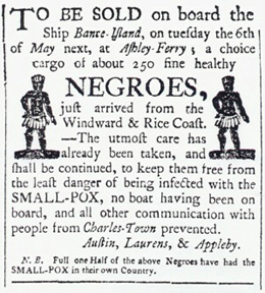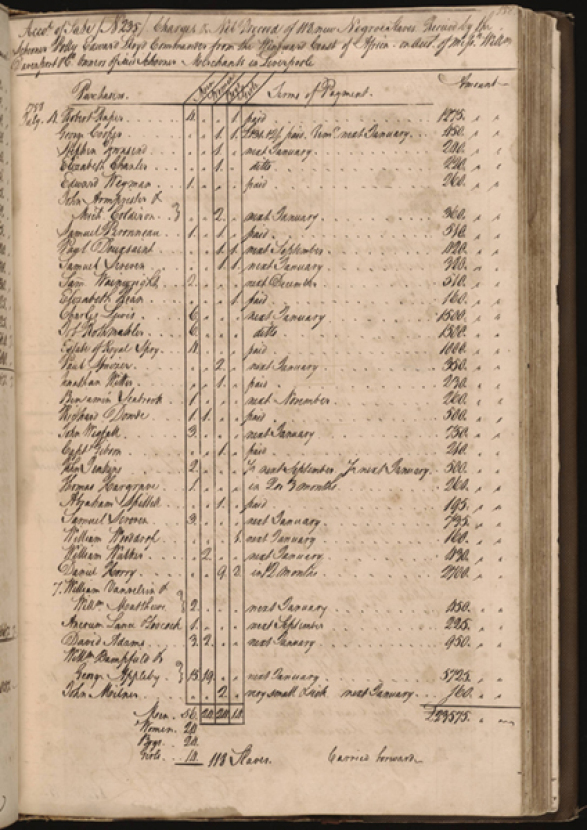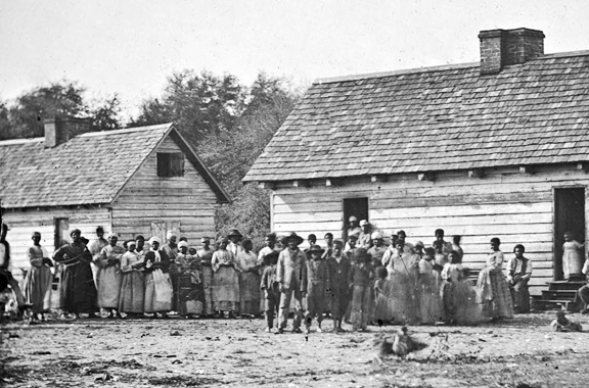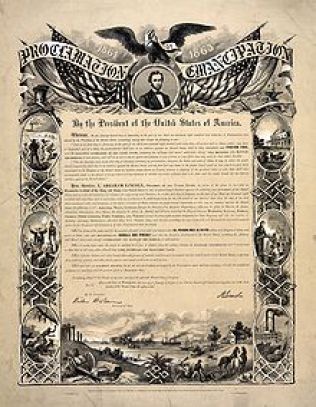Documents of Freedom
THE ABOLITION OF THE INSTITUTION OF
SLAVERY IN THE UNITED STATES OF AMERICA
Approximately 600,000 slaves were imported into the 13 colonies of the U.S, constituting 5% of the total twelve million slaves brought from Africa to the Americas. The
great majority of African slaves were transported to sugar colonies in the Caribbean and to Brazil.
Destination Percentage
Portuguese America 38.5%
British America (minus North America) 18.4%
Spanish Empire 17.5%
French Americas 13.6%
British North America 6.45%
English Americas 3.25%
Dutch West Indies 2.0%
Danish West Indies 0.3%
The Emancipation Proclamation was instrumental in obtaining freedom for 3,063,392 slaves in 10 states:
1. Arkansas 111,104
2. Alabama 435,132
4. Georgia 462,232
5. Mississippi 436,696
6. North Carolina 275,081
7. South Carolina 402,541
8. Texas 180,682
9. Virginia (part) 450,437
10. Louisiana (part) 247,734
The following eight States did not honor The Emancipation Proclamation, which contained an additional 831,780 slaves, distributed as follows:
1. Delaware 1,798
2. Kentucky 225,490
3. Maryland 87,188
4. Missouri 114,465
5. Tennessee 275,784
6. Louisiana (part) 85,281
7. West Virginia 12,761
8. Virginia (part) 29,013
All remaining slaves were emancipated by the Thirteenth Amendment to the Constitution, bringing the total number of freed slaves to
3,895,172.
THE LONG ROAD TOWARDS
FREEDOM
Northern States:
1777 – 1804 – Revolutionary War – Anti–slavery laws passed in every state north of the Ohio River and the Mason–Dixon Line
1810 – 75 percent of all African Americans in the North were free
1829 – New York State frees its last slaves
1840 – Virtually all African Americans in the North were free
1840 – Rhode Island had five slaves still listed in the census
1847 – Pennsylvania's last slaves were freed
1848 – Connecticut completely abolished slavery
1860 – Republican Party candidate, Abraham Lincoln, wins the presidential elections
1861 – The beginning of the Civil War
April 16, 1862 – President Lincoln signed the Compensated Emancipation Act, which freed over 3,000 slaves in the District of Columbia (the nation’s capital) just 9 months prior to the Emancipation
Proclamation.
** New Hampshire and New Jersey did not abolish slavery until the nationwide emancipation in
1865.
Southern States
September 22, 1862 – President Lincoln issued a preliminary proclamation warning that he would order the emancipation
of all slaves in any state (or part of a state) that did not end their rebellion against the Union by January 1, 1863.
None of the Confederate states restored themselves to the Union, and Lincoln's order, signed and issued January 1,
1863, took effect.
January 1, 1863 – Emancipation Proclamation ratified – Executive order issued by President Abraham Lincoln to enforce
the abolition of slavery.
December 1863 – Proclamation for Amnesty and Reconstruction – Offered amnesty to those engaged in rebellion if they
would take an oath of allegiance
“I do solemnly swear in presence of Almighty God, that I will henceforth faithfully support, protect, and defend the Constitution of the United States and the Union of the States thereunder; and that
I will, in like manner, abide by, and faithfully support, all acts of Congress passed during the existing rebellion, with reference to slaves, so long, and so far, as not repealed, modified, or held
void by Congress, or by decision of the Supreme Court, and that I will, in like manner, abide by and faithfully support, all proclamations of the President made during the existing rebellion, having
reference to slaves, so long, and so far, as not modified, or declared void by decision of the Supreme Court, so help me God.”
December 14, 1863 – Bill calling for constitutional amendment to permanently abolish slavery
nationally.
January 11, 1864 – Joint resolution for a constitutional amendment abolishing slavery
February 8, 1864 – Constitutional amendment introduced stating:
“All persons are equal before the law, so that no person can hold another as a slave; and the Congress shall have power
to make all laws necessary and proper to carry this declaration into effect everywhere in the United States.”
February 1, 1865 – Lincoln signs the Thirteenth Amendment
April 10, 1865 – Civil War
ends
April 15, 1865 – President Lincoln shot and killed
1865 & 1866 – In response to the abolishment of slavery and to the passing of the 13th Amendment, Southern states
begin to issue Black Codes – Based on the Slave Codes of previous centuries, the Black Codes were purposed to restrict opportunities for blacks, keep them from becoming members of the community, and
ensure a stable black workforce for large landowners.
1866 – Congress passed Civil Rights Act
In response, the Ku Klux Klan forms in Tennessee and spreads its membership throughout the southern
states.
1867 – Reconstruction Act ratified – Radical Reconstruction begins
The Republican Party took control of Reconstruction, forcing southern state legislatures to repeal many of the black
codes. Nonetheless, many wealthy white southerners continued to enforce the codes unlawfully for years, even decades, after Reconstruction.
1867 – Peonage Act of 1867 – Congress abolished “the holding of any person to service or labor under the system known
as peonage.”
1868 – The Fourteenth Amendment is ratified – Defines citizenship & mandates equal protection under the
law.
Section 1. All persons born or naturalized in the United States, and subject to the jurisdiction thereof, are citizens
of the United States and of the State wherein they reside. No State shall make or enforce any law which shall abridge the privileges or immunities of citizens of the United States; nor shall any
State deprive any person of life, liberty, or property, without due process of law; nor deny to any person within its jurisdiction the equal protection of the laws.
Section 2. Representatives shall be apportioned among the several States according to their respective numbers,
counting the whole number of persons in each State, excluding Indians not taxed. But when the right to vote at any election for the choice of electors for President and Vice President of the United
States, Representatives in Congress, the Executive and Judicial officers of a State, or the members of the Legislature thereof, is denied to any of the male inhabitants of such State, being
twenty–one years of age, and citizens of the United States, or in any way abridged, except for participation in rebellion, or other crime, the basis of representation therein shall be reduced in the
proportion which the number of such male citizens shall bear to the whole number of male citizens twenty–one years of age in such State.
Section 3. No person shall be a Senator or Representative in Congress, or elector of President and Vice President, or
hold any office, civil or military, under the United States, or under any State, who, having previously taken an oath, as a member of Congress, or as an officer of the United States, or as a member
of any State legislature, or as an executive or judicial officer of any State, to support the Constitution of the United States, shall have engaged in insurrection or rebellion against the same, or
given aid or comfort to the enemies thereof. But Congress may, by a vote of two–thirds of each House, remove such disability.
Section 4. The validity of the public debt of the United States, authorized by law, including debts incurred for
payment of pensions and bounties for services in suppressing insurrection or rebellion, shall not be questioned. But neither the United States nor any State shall assume or pay any debt or obligation
incurred in aid of insurrection or rebellion against the United States, or any claim for the loss or emancipation of any slave; but all such debts, obligations and claims shall be held illegal and
void.
Section 5. The Congress shall have power to enforce, by appropriate legislation, the provisions of this
article.
1868 – Klansmen murdered several hundred black voters in Louisiana
1870 – The Fifteenth Amendment is ratified – Bans racial voting restrictions.
Section 1. The right of citizens of the United States to vote shall not be denied or abridged by the United States or
by any State on account of race, color, or previous condition of servitude.
Section 2. The Congress shall have power to enforce this article by appropriate
legislation.
1871 – Congress passes Ku Klux Klan Act of 1871 – Intended to stop violence and
intimidation
1875 – Congress passes Civil Rights Act – Upheld the right to be in public places and to serve on a
jury
_____________________
** Jim Crow South follows.





